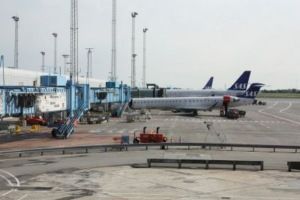News
Business Round-Up: Copenhagen Airport reports historic decline in profit
This article is more than 5 years old.
Elsewhere, DSB struggles, ISS gets a new boss, and big guns Maersk and Danish Crown are wary of the future

Copenhagen Airport is at its busiest in years (photo: Dornum72)
The Coronavirus Crisis has had considerable ramifications to the first quarter of the year for Copenhagen Airport.
The airport reported a steep decline in profit of almost 70 percent for the first three months of the year.
Restrictions on flying and operating with fewer passengers led the airport’s profit to drop from 258.4 million to 79.4 million kroner compared to the same period last year.
Meanwhile, its total revenue declined by 21 percent to 764.3 million kroner in the first quarter.
READ ALSO: SAS to lay off 5,000 workers in Scandinavia
Crisis of consequence
“Normally, we have 83,000 travellers on a daily basis. In the last week of March, we had an average of 1,600. In April, that number dropped to fewer than 900 per day. More than 90 aircraft are parked long term at the airport,” said Copenhagen Airport CEO Thomas Woldbye.
“We have decided they can park free of charge to reduce the airlines costs. A total of 143 of the 146 shops and outlets serving food and drinks are closed. In other words, virtually all of our income and our business platform has been wiped out in only a matter of a few weeks.”
The airport’s current strategy is to reduce its operating costs and postpone scheduled investments of 1 billion kroner for the rest of the year.
In addition, this month it entered into a 6 billion kroner loan agreement while being exempted from loan requirements until the first three months of 2021.
Finally, it has also been assisted from the state’s financial aid schemes and will be compensated for the ongoing labour costs through the wage compensation scheme.
New CEO for ISS
After being rejected as the chief executive position of Danske Bank by the Danish Financial Supervisory Authority, Jacob Aarup-Andersen has been appointed as the next head of the Danish service organization ISS – first founded as security firm more than a century ago. The 42-year-old is set to start his new posting on September 1, replacing Jeff Gravenhorst, who is stepping down after a decade at the helm.
Surging Maersk expects a global decline in demand
The Danish shipping giant Maersk has reported a marginal increase in its revenue and a profit of almost 1.4 billion kroner for the first quarter of the year. That compares nicely to the deficit of 4.5 billion kroner that the firm noted last year. However, the company expects a decline of 20-25 percent of global demand for the rest of the year.
Danish government reopens voucher scheme discussion
The government has decided to reopen discussions pertaining to the rescue package for travel companies despite it being rejected by the European Commission, reports Erhvervplus.dk. The rescue package is intended to allow travel companies to issue vouchers instead of cash refunds, a move that conflicts with EU law on passenger rights.
Porky figures from Danish Crown
Danish slaughterhouse firm Danish Crown has reported an increase of 46 percent in its sales of pork meat over the past a six months. The company’s total sales increased to 32 billion during the period – 18 percent higher than the same period in the previous year. However, the company expects its figures in the second half of the year to be affected by a downturn in activity in the food service industry brought on by the Coronavirus Crisis.
DSB expects billion-kroner deficit for 2020
DSB expects to endure a deficit of at least one billion kroner by the end of 2020. Operating under the coronavirus restrictions, the state-owned company has seen a decline of 199 million kroner before tax for the first three months of the year. While it has secured cash for the rest of the year through banking facilities, the future seems more uncertain. This has sparked plans of reducing costs up to 130 million and with an average – including no hiring of new employees. It is unknown whether the company will let go a portion of its current staff.










































